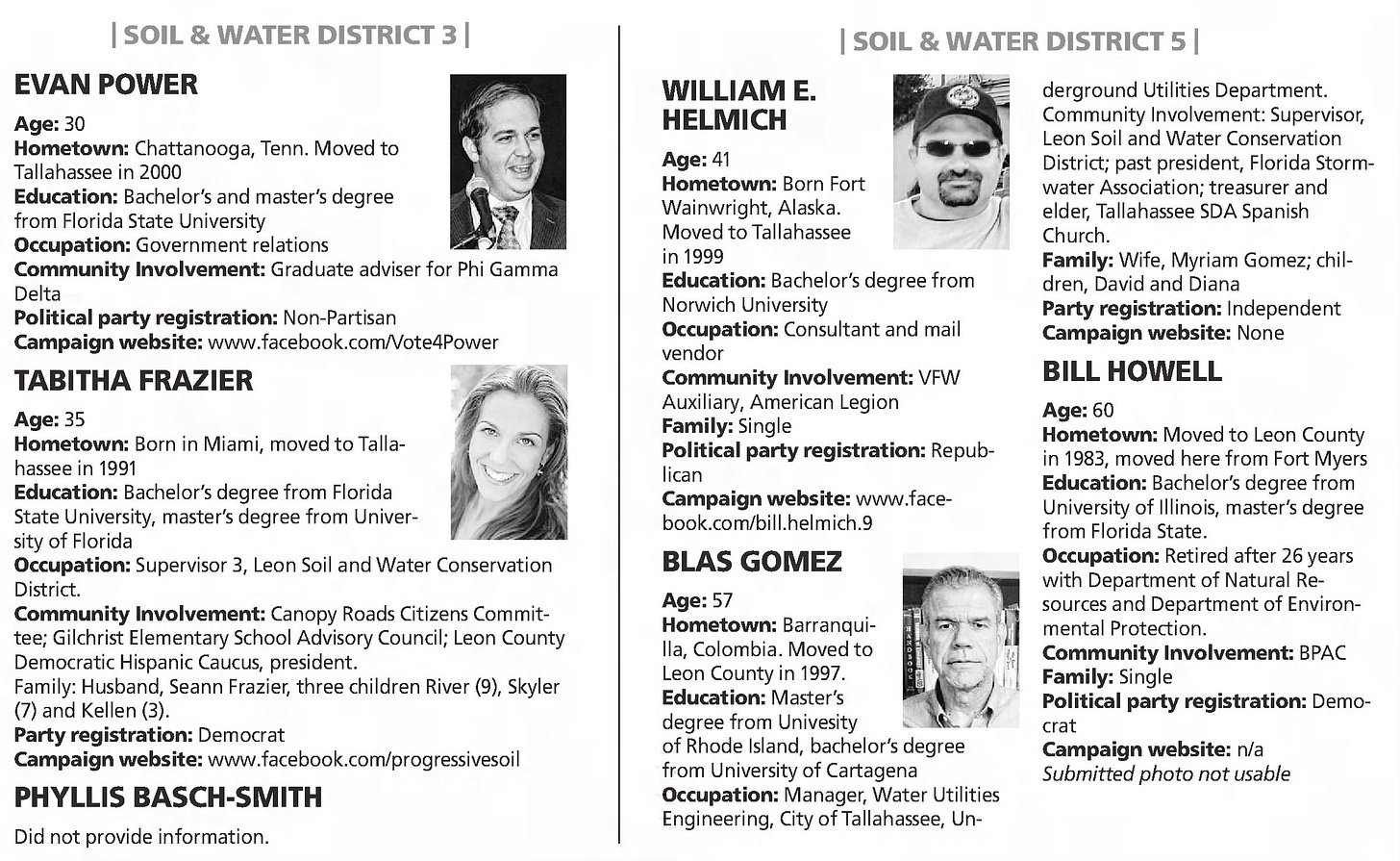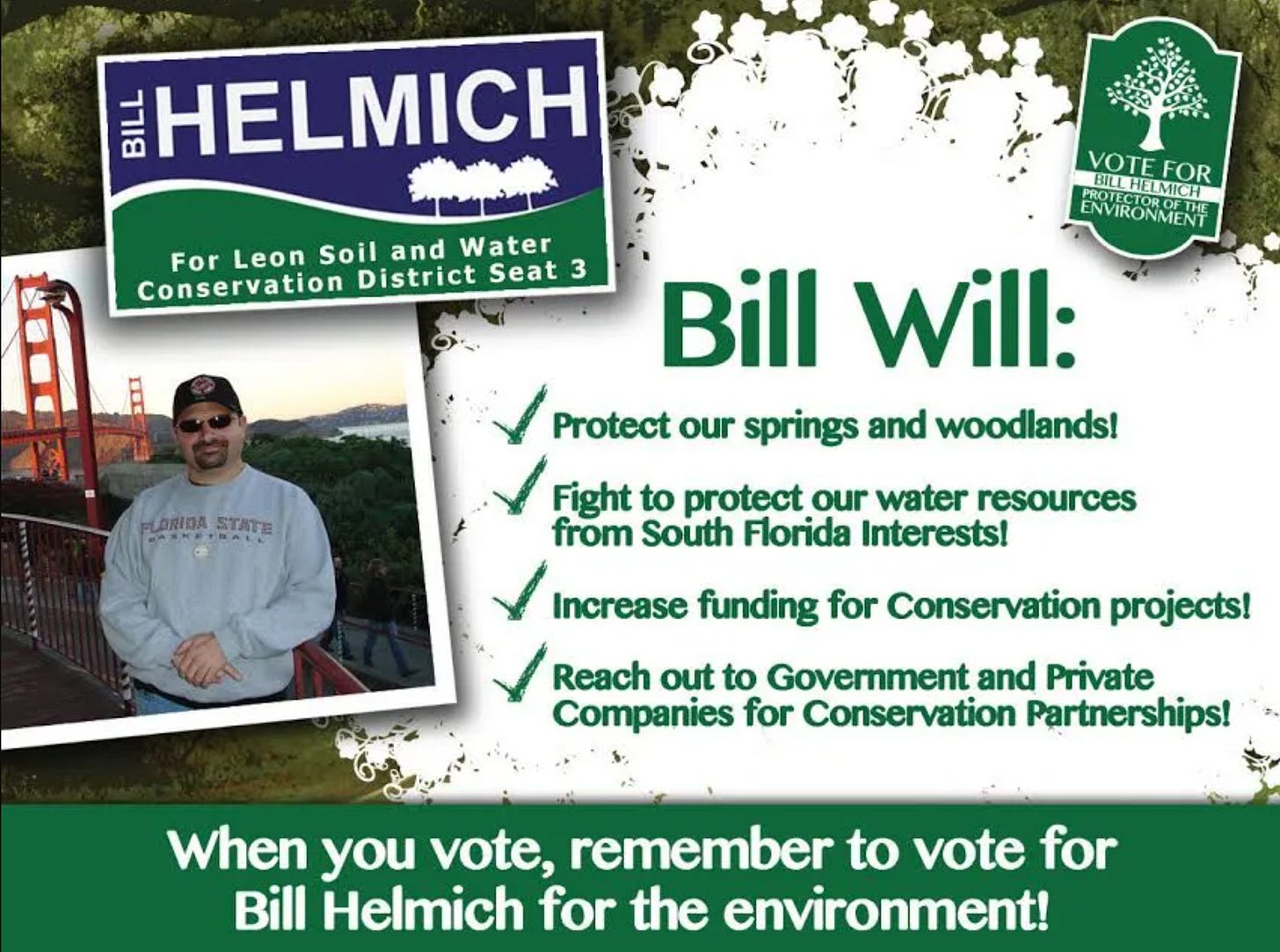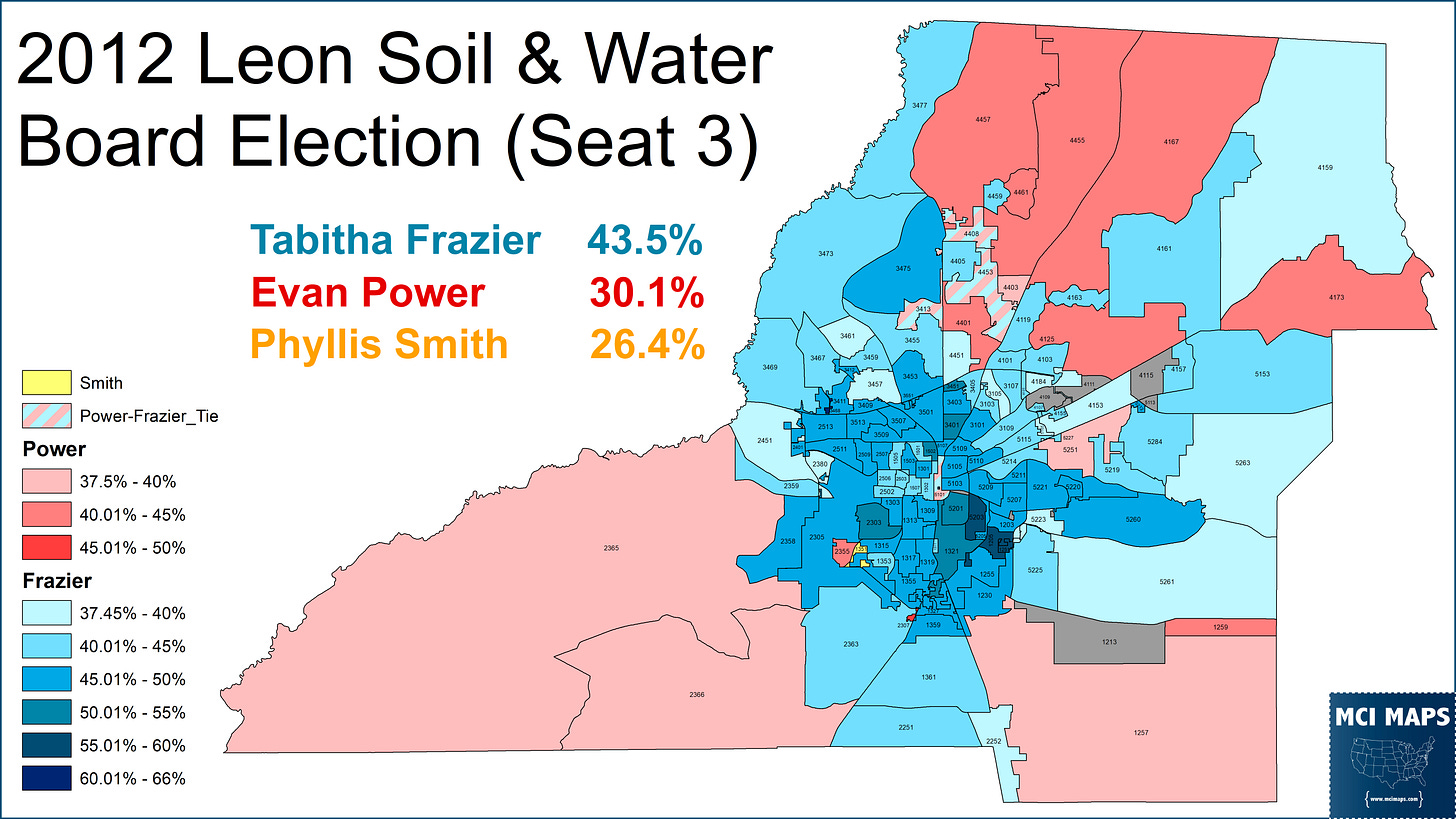Issue #170: Bill Helmich and the Saga of Florida's Soil and Water Boards
Bill Helmich has lost four elections
On Friday, April 12th, the Florida Republican Party announced that Bill Helmich, a lobbyist and political consultant, was being named interim executive director. The appointment comes as ED George Riley seeks treatment for alcohol and other personal matters. Helmich’s elevation means he will be working with a longtime friend and ally, Chairman Evan Power, who himself came to power in just the last few months.
Power took the Chairmanship after Christian Ziegler was forced out when it was revealed he and his wife, Sarasota School Board member Bridget Ziegler, engaged in a 3-way relationship with another woman. The revelation came as Christian was accused of sexual assault by the third woman. While it appears Christian will not face charges, the personal scandal led to his forceful removal, even as he resisted calls to resign. Bridget, who is an anti-LGBT voice on the school board, has resisted calls to resign despite her blatant hypocrisy.
With Power now chairman and the role of executive director needing a temporary head, the Chairman has turned to Helmich, a longtime Tallahassee ally, for the post. Both men have long been seen as brothers in arms in Leon/Tallahassee Republican circles. Power has been Leon Republican Chair while Helmich has severed many local party roles. Both of them are also bound by their failed electoral bids for two Leon County Soil and Water seats back in 2012. In honor of Helmich’s appointment, I wanted to look back at his and Evan’s 2012 campaigns, as well as several other times Helmich ran for and lost electoral office in Leon County.
Now, for my Republican readers, I know what you are thinking. “Oh look the sad little Democrat wants to mock us to distract himself from the fact we run this state with an iron fist.” Well to that I say…..
Yes I am self-aware, but I am also a petty motherfucker. Also, this does give me the chance to discuss Soil and Water Boards, something I’ve wanted to explore for some time. This obscure electoral post in Florida has long history and has been the subject to GOP retaliation in recent years.
What the hell are Soil and Water Districts?
Now I imagine that when I mentioned Soil and Water districts, 90% of you were “what the hell are those?” I don’t blame you, as they are some of the most obscure offices in the state. However, they have a rich history. Back in 1937, Florida created the soil and water district system. These were created to….. and I’m just going to quote the statue here…..
“to provide assistance, guidance, and education to landowners, land occupiers, the agricultural industry, and the general public in implementing land and water resource protection practices” (Chapter 582, Florida Statutes, Section 582.02)
Florida, along with many states, created these districts in conjunction with the federal government under FDR’s New Deal. Following the 1930s Dust Bowl, the federal government declared that soil and water management were a major federal concern and launched a series of initiatives to work with states to prevent future disasters. Many states thus created these “soil and water districts” to localize the focus on ensuring best resource management. The power of these offices vary by state, with them taking on an advisory role only in Florida by this point.
There are currently 55 soil and water districts in Florida, all unpaid positions that largely aim at outreach on land and water use issues. How active a board wants to be can vary greatly. This University of Florida coverage of such districts lays out the following….
“SWCDs are involved in such activities as implementing agricultural practices to protect soil, water, air, and wildlife; protect and restore water resources; work with developers to protect natural resources during construction stages; and implement outreach activities. Specifically, SWCDs may conduct research, teach best management practices for soil and water conservation, and develop comprehensive plans for soil erosion control and flood prevention.”
The boards have no enforcement mechanisms but can recommend policies and point out failures to adhere to water and land conservancy rules. When they were initially created they were much more farmer-centric, but in recent years have became more of a destination by environmentalist that want to use the boards for conservation advocacy.
Not every county has a soil and water district. Those that do can be seen below.
Almost all districts are simply named after their respective county. However, some have alternative names that normally represent a major environmental feature. For example, DeSoto is called the “Peace River” district while Gulf is called “Tupelo.” Only one district is made up of multiple counties; with the Chipola River district covering Calhoun and Liberty counties.
The process for districts to be formed is in state law; starting with local petitions, a review by the Department of Agriculture on feasibility, and then a local referendum. The referendums and petitions for the creation of such a district are limited to LAND OWNERS within the jurisdiction in question. Once a district is created, however, board seats are elected by all voters in the jurisdiction. These are non-partisan elections held in November of even numbers years. The highest vote total wins, with no runoffs if someone gets under 50%.
The boards can be eliminated via popular referendum open to all voters. Two-thirds of the vote is needed to eliminate the board. For example, in 1980, Pinellas County voted with 66.2% to eliminate its board, JUST SHY of threshold. The vote came after a board member led the charge to eliminate the post. The Pinellas vote also led to confusion as some voters clearly did not know what the board did, if anything, and some worried they were gutting a water control board. One year later, the legislature passed a law to just eliminate the board for the county, which happened with little outcry.
Soil and Water boards saw a major overhaul in 2022 with new Republican-pushed legislation. The law required that anyone running for these boards needed to have current or 10 years of past “farming-related experience”. The legislation led to a large number of board members forced to resign. The move is clearly seen as a effort to strengthen the hand of developers and major agriculture conglomerates while weakening the environmentalist influence. It was the latest in blatant power grabs from the legislature and their corporate allies.
The legislation change follows a litany of conservative candidates attempting to win spots on these boards. With that in mind, lets talk about said efforts in Leon County.
The Crazy 2012 Campaigns
Soil and Water District elections are rarely notable affairs. Held the same day as Governor or Presidential elections, these races are overlooked and more often than not unopposed. Even in contested races, most candidates spend no money to get elected, with voters only knowing about candidates if local news covers them.
Well in 2012 Leon County, the Soil and Water board races suddenly got more attention than ever before. Three seats were up and two of them featured notable partisan Republicans running. In the district 3 race, Evan Power ran against incumbent Tabitha Frazier, while in district 5, William Helmich ran against incumbent Blas Gomez.
Both Power and Helmich raised $8,700; largely through self-funding and political committees. In the grand scheme of Soil and Water races, this is like raising a million bucks for a commission contest in a modest-sized county. Both coordinated their campaigns with similar yard signs and messaging. Both ran as environmental progressives.
Neither are actual environmentalists, with both having ties to oil, gas, and utility interests. It was widely understood both wanted to get on the board for the simple goal of saying they were elected officials while also leveraging their positions to weaken the activism of the board, which was in the hands of several environmentalists. To further highlight this deception, see how Power lists himself as an NPA in the newspaper profiles further up? Well he was a registered Republican and vice chair of the Leon GOP at that very moment.
The most high-profile board member was Tabitha Frazier, the future Leon Democrats Committeewoman and a well known grassroots activist for liberal candidates. In the interest of disclosure, I’ve been friends with Tabitha since 2010, meeting her when I was a graduate student and went to a fundraiser at her house. That personal tie aside, I think we can all agree she had great yard signs in her race.
Frazier raised $2,800 to defend her seat, still a solid amount of money for these posts. Most money from any campaigns went to yard signs, selected mailings, and radio ads. This duel add from Helmich and Power can be heard below.
In Helmich’s race, incumbent Gomez and fellow challenger Bill Howell spent no money.
At the time I followed these races closely. Still in grad school, I was volunteering with the Leon Democratic Party as part of the campaign committee. One goal I had was to make sure the environment lies from Power and Helmich did not fool people. At a DEC meeting I talked with the full body about both candidates. Then on the last day of early voting, where I was at the courthouse handing out drinks and snacks to those waiting in line, I had an amusing interaction with both men. See below.
I bring these interactions up for two reasons. One, disclosure, lest anyone think I am hiding my personal ties to both men. Second, to really highlight how amusingly childish they are. I was beyond tickled by their actions at the early voting sites and much more angry with their dismissal of Tabitha’s education background.
A few days later, both Power and Helmich went down in flames. Power got 30% of the vote to Frazier’s 44%. Fellow Democrat Phyllis Smith got 26%.
Power at least managed to win several of the most steadfast Republican precincts in the county; from several rural communities and the upper-income northern suburbs.
For Helmich, however, it was a humiliation. He won zero precincts and got just 25% of the vote. Incumbent Blas Gomez also lost, however, with challenger William Howell sweeping the race.
Now, to be far to both Powell and Helmich, these races still feature low information, ALOT of blank ballots, and random chance to some degree. Howell, after all, spent no money. Granted folks reading the paper or listening to coverage may have heard he worked for the FL Department of Environmental protection. If I was a low-information voter and I knew that bio fact, I’d be “yeah that sounds good.” Meanwhile, Power and Helmich ever being referenced as Republicans also risked hurting them in a county where Mitt Romney only got 37%.
After these races, Power would not run for the office again. Helmich, however, would make SEVERAL more runs for the post of Soil and Water Board.
Helmich’s Continued Efforts
After the 2012 expensive races, Helmich would not mount such an aggressive campaign again. However, he would run three more times for the office. These races have less campaign details, so I’ll breeze through them.
In 2014, Helmich filed to run against incumbent Stan Peacock, who’d won his post in 2010. Neither candidate spent any money, aside form Helmich paying the $25 qualifying fee. While spending no money, Helmich managed to do better than 2012, getting 36% of the vote, winning just a few precincts.
Its like the less people heard of him, the better he did.
Two years later, Helmich would make another bid for soil and water board. That time he would try to avenge Power by taking on Tabitha Frazier as she sought re-election. Like 2014, neither candidate spent any money. Frazier was well known in liberal circles while Helmich spent most of his time focused on Republican Party efforts. He was a major advisor to failed commission candidate Manny Joanos and largely was a Trump mouthpiece. As a result the race results took on a more clear partisan trend, but in such a blue county that gave Clinton over 60% of the vote, that was doom for Helmich.
Helmich took many of the same precincts that would back Trump that same day.
Finally, in 2018, Helmich made one more go of it. He challenged Brian Lee, a likewise well-known environmental and democratic operative/activists who’d won his seat in 2014. In the 2014 race, Lee raised over $8,000 via grassroots fundraising, making him one of the biggest fundraisers in the modern history of the office, raking in over 150 donations, most small-dollar. In 2018, like Frazier before him, Lee saw no need to raise or spend money, confident in his name ID. Helmich again spent nothing, and again lost with 39% of the vote. This time he took fewer precincts.
This final loss put an end to the Helmich Soil and Water Board efforts.
Neither Helmich or Power ever got their soil and water board seats. However, they finally find themselves in positions of influence. I hope their tenures go just as well as their 2012 efforts to win one of Florida’s most obscure offices.















While not central to your piece, I would have hoped that you would give a little ink to the reason WHY the legislature changed the requirements for S&WCD positions -- developer and state senator Travis Hutson (R-Palm Coast) saw one of his developments shot down after the local S&WCD publicized the environmental impacts on ... wait for it ... soil and water.